Children’s Trust of South Carolina, the statewide organization working to prevent child abuse, neglect and injury, has released its annual KIDS COUNT child well-being data by county.

Using KIDS COUNT data from the Annie E. Casey Foundation, Children’s Trust has released the annual child well-being profiles for each county in South Carolina.
The profiles rank South Carolina’s 46 counties on 16 indicators of child well-being across four domains: economic well-being, education, health, and family and community. They provide a snapshot into the status of children and families in South Carolina. When children thrive, they meet educational milestones, live in economically stable homes and in supportive communities, and they are more likely to grow into productive, contributing members of our state.
York County ranked No. 1 overall for the sixth consecutive year. Rounding out 2019’s Top 10 were Dorchester, Greenville, Lexington, Beaufort, Pickens, Berkeley, Anderson, Richland, and Spartanburg counties.
The counties making the biggest leaps forward were Union, which improved by 17 spots to No. 21; Clarendon, which climbed 10 places to No. 32; and Colleton, which jumped eight spots to No. 29. Calhoun and Hampton both improved seven places to Nos. 17 and 28, respectively.
However, as the profiles show, too many of South Carolina’s children live in environments that may put them at risk for negative outcomes, including child abuse and neglect. Rural counties with high poverty rates historically struggle in these rankings.
The county profiles provide extensive detail so that local experts can make data-driven decisions as they work to improve the lives of children and families. Supportive communities that provide health and educational resources help ensure their children have the opportunity to thrive.
Children’s Trust works with state, county and community partners on programs and initiatives that provide home visiting services, strengthen families, promote positive parenting, and address adverse childhood experiences.
Dr. Aditi Srivastav Bussells, Children’s Trust research and community impact manager, is responsible for leading research efforts around child maltreatment to promote child health and well-being. She oversees the S.C. Adverse Childhood Experiences Initiative by managing data dissemination and providing leadership for the ACE training program.
She believes this county data can help community leaders identify where additional support is needed to build well-being and resilience. It also can provide a roadmap to prevent ACEs and allow children to reach their full potential.
“ACEs are an easy concept: what happens to you in childhood affects your adulthood, and now we have science, the training and the data to help support it,” Bussells said. “Our initiative focuses on the notion that we can prevent not only the long-term consequences of ACEs, but we can keep them from happening in the first place — and we can do this by mobilizing our communities to make data-informed decisions that help change our norms, our programs, and our policies around how we respond to and address traumatic events.”
 These county profiles can help community organizations make smarter funding and service decisions, while the data can assist everyday citizens become better-informed advocates for policy change within their communities. They also can be used in a wide variety of ways: grant writing, community and coalition meetings, decision-making, policy and advocacy.
These county profiles can help community organizations make smarter funding and service decisions, while the data can assist everyday citizens become better-informed advocates for policy change within their communities. They also can be used in a wide variety of ways: grant writing, community and coalition meetings, decision-making, policy and advocacy.
County-level data and profile sheets for each of South Carolina’s counties are available on our website. As the KIDS COUNT affiliate for South Carolina, Children’s Trust uses this high-quality data and trend analysis to advance evidence-based programs that can help provide better futures for children.
When the annual national rankings were released in June, South Carolina achieved a ranking of No. 39, its third consecutive year in the 30s after spending the first 27 years of the KIDS COUNT rankings in the 40s.
2019 South Carolina County Child Well-Being Rankings
1. York
2. Dorchester
3. Greenville
4. Lexington
5. Beaufort
6. Pickens
7. Berkeley
8. Anderson
9. Richland
10. Spartanburg
11. Charleston
12. Horry
13. Oconee
14. Abbeville
15. Aiken
16. Lancaster
17. Calhoun
18. Newberry
19. Kershaw
20. Edgefield
21. Union
22. Cherokee
23. Saluda
24. Georgetown
25. Florence
26. Greenwood
27. Sumter
28. Hampton
29. Colleton
30. Chesterfield
31. Chester
32. Clarendon
33. Darlington
34. Bamberg
35. Laurens
36. Fairfield
37. Marlboro
38. Orangeburg
39. Jasper
40. McCormick
41. Marion
42. Barnwell
43. Dillon
44. Lee
45. Williamsburg
46. Allendale





